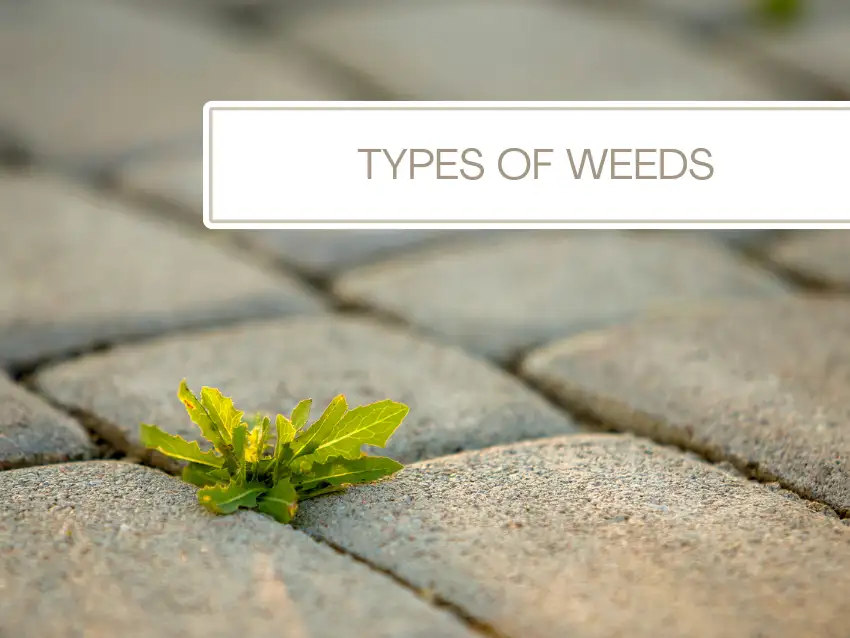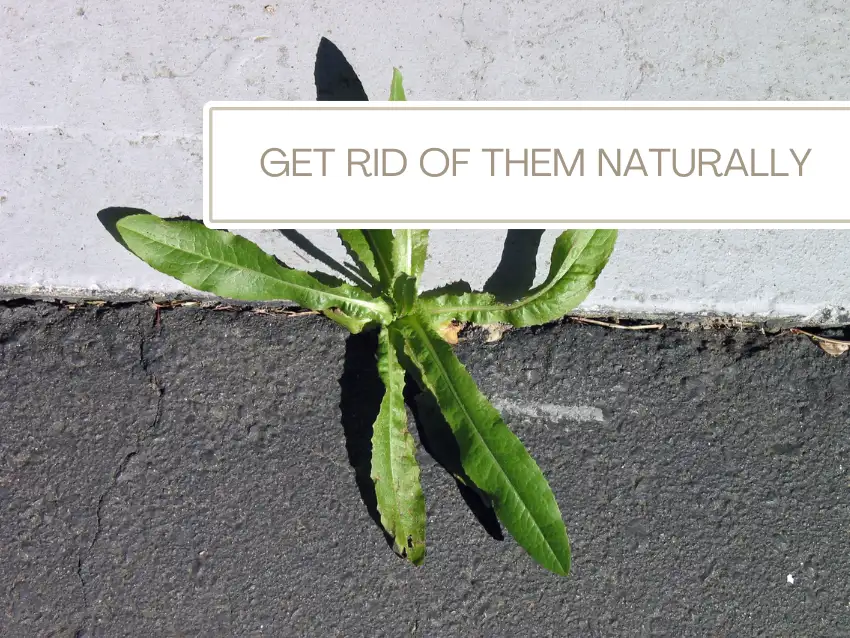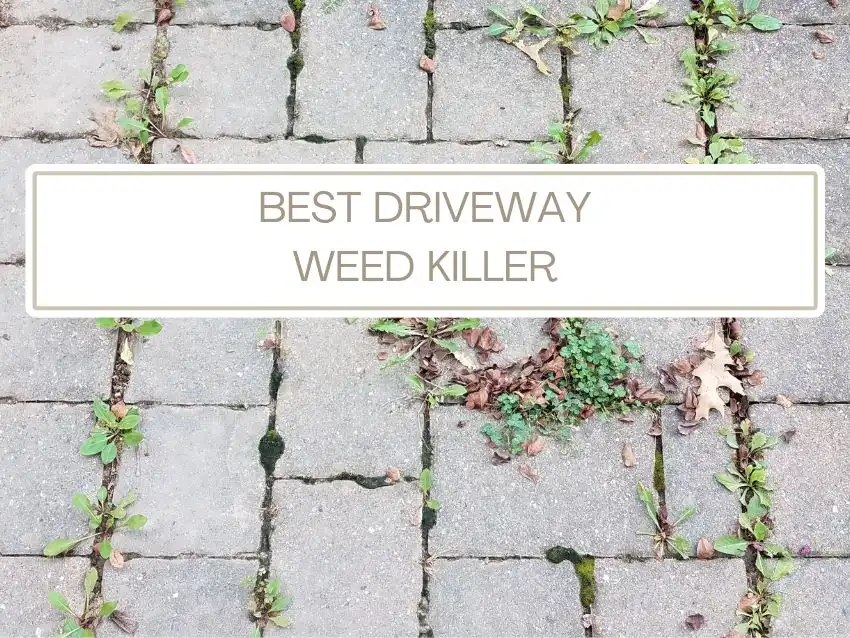Weeds sprouting through the cracks and crevices of driveways are a common and frustrating issue for homeowners. Not only do they detract from the aesthetic appeal of the property, but they can also cause significant damage to the driveway’s structure over time. Choosing the right weed killer is crucial in maintaining both the appearance and integrity of your driveway.
This article aims to explore various weed control methods, focusing on identifying the best driveway weed killer. We will delve into understanding driveway weeds, the types of weed killers available, and how to select and apply these solutions effectively. By the end of this guide, you will be equipped with the knowledge to make an informed decision on combating weeds in your driveway, considering effectiveness, environmental impact, and safety.
Understanding Driveway Weeds
This invasion of weeds into driveways is not merely a cosmetic issue but a testament to the tenacity of nature as it reclaims even the smallest of footholds in man-made environments. The process begins subtly, with spores and seeds carried by the wind, water, or transported on the tires of vehicles, finding their way into the most minuscule openings.
Over time, these unassuming seeds take advantage of the slightest accumulation of soil and moisture trapped in cracks, germinating into full-fledged weeds. This scenario underscores the dynamic interaction between the built environment and the natural world, where even the most meticulously constructed driveways are not immune to the persistent encroachment of weeds.
Types of Weeds Commonly Found in Driveways

Driveway weeds can generally be categorized into three types:
-
- Annual Weeds: These weeds complete their life cycle within a year, spreading rapidly and producing a large number of seeds. Examples include crabgrass and chickweed.
- Perennial Weeds: With the ability to live for more than two years, these weeds often have deep root systems that make them more difficult to eradicate. Dandelions and thistles are common perennial weeds found in driveways.
- Grass-Like Weeds: These are often mistaken for grass but are undesirable in driveways. They include nutsedge and quackgrass, which can be particularly tough to remove due to their extensive root systems.
Impact on Driveway Aesthetics and Structure
Weeds can significantly impact the appearance of a driveway, making it look unkempt and poorly maintained. Beyond aesthetics, the roots of these weeds can cause structural damage. As they grow, they widen cracks and crevices, leading to further deterioration, which can result in costly repairs.
Types of Driveway Weed Killers
Weed control strategies can be broadly categorized into chemical and natural methods. Each approach has its specific applications, advantages, and limitations.
Chemical Weed Killers
Chemical herbicides are among the most common solutions for controlling weeds in driveways due to their effectiveness and quick action.
-
- Selective Herbicides: Designed to target specific types of weeds without harming surrounding plants. These are ideal when the weeds are among the desirable vegetation that you wish to keep. However, their use on driveways is limited due to the general absence of desirable plants in such areas.
- Non-selective Herbicides: These herbicides kill all vegetation they come into contact with and are perfect for use in driveways where complete removal of weeds is desired. They are particularly effective for treating weeds in cracks and crevices but must be used carefully to avoid damaging nearby landscaping.
- Systemic vs. Contact Herbicides: Systemic herbicides are absorbed by the weeds and work from the inside, killing the plant entirely over time. Contact herbicides, on the other hand, kill only the parts of the weed they touch, making them effective for quick, surface-level weed control.
Pros of Chemical Weed Killers :
-
- Fast-acting and effective for a wide range of weed types.
- Convenient and easy to apply.
Cons Chemical Weed Killers :
-
- Potential harm to the environment and non-target plants.
- Safety concerns for pets and humans if not used properly.
- May require repeated applications for perennial weeds.
Homemade and Organic Driveway Weed killer Options

For those seeking eco-friendly solutions, several natural and organic options can be effective in controlling driveway weeds.
-
- Manual Removal: For minor infestations, the first action to take to remove pesky weeds is of course by pulling them by hand or using tools like weed pullers can be effective, especially if done regularly.
- Salt and Boiling Water Techniques: Salt can dehydrate plants and prevent their growth, while boiling water can kill weeds instantly by scalding them. Both methods are non-selective and should be used with caution to avoid damaging adjacent plants or soil health.
- Vinegar-based Solutions: Household vinegar, especially in higher concentrations, can be used as a natural herbicide. It works best on young, annual weeds and needs to be applied directly to the foliage.
- Landscaping Fabric and Mulches: These can serve as a physical barrier to weed growth, especially useful under gravel driveways or around pavers.
- Commercial Organic Herbicides: There are several organic herbicide products on the market designed to offer an eco-friendly alternative to chemical weed killers. These are often made from natural ingredients like citrus oil, clove oil, or acetic acid.
Pros of Homemade and Organic Weed killers :
-
- Safer for the environment, pets, and humans.
- Minimizes the risk of contaminating groundwater.
Cons of Homemade and Organic Weed killers :
-
- May be less effective on tough, perennial weeds.
- Often requires more frequent applications.
These methods can be a bit more labor-intensive or require upfront investment but offer sustainable, long-term solutions to weed control without the environmental impact of chemical herbicides.
Natural Homemade Weed Killer Recipe
Here is a recipe you can try at home.
Ingredients:
-
- 1 gallon of white vinegar
- 1 cup of salt
- 1 tablespoon of liquid dish soap
- Spray bottle
Instructions:
-
- Mix Ingredients: In a large container, combine the white vinegar and salt. Stir the mixture until the salt is completely dissolved. This may take a few minutes as the salt needs to integrate fully with the vinegar.
- Add Dish Soap: Once the salt is dissolved, add the liquid dish soap to the mixture. The dish soap acts as a surfactant, which helps the vinegar and salt solution adhere to the weed leaves, increasing the effectiveness of the weed killer.
- Transfer to Spray Bottle: Carefully pour the mixture into a spray bottle using a funnel if necessary. Ensure the spray bottle is clean and free from any residues that might dilute the effectiveness of your weed killer.
- Apply to Weeds: Spritz the weeds directly with the solution, aiming to coat all surfaces of the weed leaves. The best time to apply is on a sunny day, as the sunlight will enhance the mixture’s effectiveness by accelerating the drying process, causing the weeds to wither more quickly.
- Reapplication: For stubborn weeds, a second application may be necessary. Wait for 24 to 48 hours to observe the full effect of the first application before deciding on a second round.Extra tip : You can also use horticultural vinegar, which has a higher acetic acid content (20-30%) compared to household vinegar (5%). This increased acidity makes it more effective at killing weeds but also more caustic, so handle with care.
Tips for Use:
-
- Targeted Application: Use the spray bottle to target weeds directly, avoiding desired plants and grass as the solution can harm them.
- Best Conditions: Apply during dry conditions to prevent dilution from rain.
- Safety: While this weed killer is made from common household items, it’s still advisable to wear gloves during preparation and application to avoid skin irritation.
This homemade weed killer is a fantastic way to manage weeds in your driveway, garden or on your patio without resorting to harsh chemicals. The ingredients are readily available, making it not only an effective but also an economical choice for garden maintenance.

How to Choose the Best Driveway Weed Killer
Selecting the right weed killer depends on several factors, including your driveway surface matérial and the type of weeds growing.
For Concrete and Asphalt Driveways:
-
- Annual and Perennial Weeds: Products like Green Gobbler Vinegar Weed & Grass Killer are effective against a wide range of weeds, including crabgrass, dandelions, and clovers. Its non-toxic, vinegar-based formula works on both annual and perennial weeds commonly found on concrete and asphalt surfaces.
- Boiling Water: This method is universally effective, regardless of weed type, as it kills the plant tissue on contact. It’s especially useful for spot treating weeds that emerge in the cracks of concrete and asphalt driveways.
For Gravel Driveways:
-
- Post-Emergent Weeds: For weeds that have already emerged, Earth’s Ally Weed and Grass Killer, with its salt water-based formula, offers an environmentally friendly and pet-safe solution. It’s particularly effective for treating annuals and perennials that proliferate in gravel areas.
- Pre-emergent Solutions: Utilizing pre-emergent herbicides can be an effective preventive strategy against both annual and perennial weeds by inhibiting their seeds from germinating.
For Paver Driveways:
-
- Crack and Crevice Weeds: Sealing the cracks with filler can prevent the growth of all types of weeds by eliminating the spaces where they typically germinate and grow. This method is effective for both annual and perennial weeds that find their way into paver driveways.
- Broadleaf and Grass Weeds: Doctor Kirchner Natural Weed & Grass Killer is suitable for a broad spectrum of weeds, including broadleaf and grassy types. Its natural ingredients make it a safe choice for use around pavers.
Further reading: Original Driveway Ideas to Enhance Your Dublin Home’s Kerb Appeal
Application Tips for Effective Weed Control
Regardless of whether you opt for chemical or natural weed killers, applying them correctly is key to maximizing their effectiveness while minimizing potential harm to the environment and surrounding areas.
Best Practices for Applying Chemical Herbicides
When it comes to maintaining a weed-free driveway, the strategic application of chemical herbicides plays a pivotal role. However, the effectiveness of these potent solutions is not just about what you apply, but how you apply it.
Adhering to best practices can significantly enhance the efficacy of herbicides while safeguarding your health, the environment, and the surrounding flora.
-
- Read Labels Carefully: Always follow the manufacturer’s instructions regarding application rates and safety precautions.
- Wear Protective Gear: Use gloves, goggles, and masks if necessary to avoid exposure to harmful chemicals.
- Apply in Ideal Weather Conditions: Avoid application during windy days or just before rain to prevent runoff and ensure the herbicide stays on target weeds.
- Use Precision Tools: For spot treatments, consider using a spray shield or a paintbrush to apply the herbicide directly to weeds, reducing contact with non-target areas.
- Timing: Early treatment when weeds are young and actively growing can improve effectiveness. Perennial weeds are best treated in early fall when they are storing nutrients in their roots.
Implementing these practices ensures that your driveway remains aesthetically pleasing and structurally sound, free from the unwelcome intrusion of weeds.
Tips for Using Natural and Organic Options
The natural methods we mentioned earlier in this article, ranging from the direct application of household ingredients like vinegar and boiling water to the mindful use of salt-based solutions, offer an eco-friendly approach to controlling unwanted vegetation. However, the success of these natural remedies hinges on understanding their application nuances and recognising their limitations.
See below for practical tips for utilizing natural weed control methods, emphasizing a balance between efficacy and environmental stewardship.
-
- Direct Application: Apply vinegar directly onto the leaves of the weeds using a spray bottle for precise application. Ensure complete coverage of the weed’s foliage to increase the herbicidal effect. The best time for application is on a sunny day because the sunlight accelerates the vinegar’s desiccating action on the weed.
- Safety Precautions: Wear protective gloves and goggles to prevent skin and eye irritation from the vinegar’s acidity. Avoid spraying on windy days to prevent drift onto desirable plants or your skin.
- Reapplication: Natural solutions often require multiple applications for full efficacy, especially after rainfall or watering.
- Consider Soil Health: Overuse of salt-based solutions can lead to soil degradation; use sparingly and only where necessary.
Preventative Measures
Preventative measures serve as the foundation of an effective long-term strategy for preventing weed regrowth on your driveway. By addressing the conditions that facilitate weed growth before they can take root, homeowners can significantly reduce the effort and resources required for weed control.
Implementing the below proactive measures not only helps maintain the aesthetic appeal and structural integrity of your driveway but also contributes to a more sustainable approach to weed management.
-
- Seal Cracks and Crevices: Regular maintenance to fill in cracks can significantly reduce weed growth by eliminating the spaces where weeds seed and develop.
- Landscaping Fabric: Installing a barrier beneath gravel or pavers can help prevent weeds from coming through.
- Regular Cleaning: Keeping your driveway clean of organic debris can reduce the likelihood of weed establishment.
Seasonal Considerations
The battle against driveway weeds is not just a matter of choosing the right herbicide or natural remedy; it is also about timing.
Seasonal considerations play a pivotal role in the effectiveness of your weed control strategy, as the changing weather conditions significantly impact weed growth cycles.
-
- Spring: Early spring is a crucial time for pre-emergent herbicide application to prevent weed seeds from germinating.
- Summer: Address emerging weeds quickly before they have a chance to seed.
- Fall: Treat perennial weeds and apply preventative measures before winter.
- Winter: Utilize the dormant season to remove any remaining weeds, enrich soil health, and plan your strategy for the upcoming year, ensuring a robust defense against weed germination and growth as temperatures rise.
Understanding these seasonal dynamics can greatly enhance your ability to maintain a weed-free driveway throughout the year, ensuring that your efforts are as efficient and effective as possible.
Weighing the Options: Chemical vs. Natural Solutions
Choosing the best driveway weed killer is a multifaceted decision that hinges on understanding the unique characteristics of your driveway, the types of weeds you’re battling, environmental and safety considerations, and your budget. While chemical herbicides are known for their quick action and broad-spectrum effectiveness, they come with considerations for the surrounding ecosystem and potential safety risks.
On the other hand, natural and organic solutions, as well as physical and preventative methods, present safer, more environmentally friendly alternatives. These options, when integrated with regular maintenance practices and proactive measures, can sustain a clean and visually appealing driveway, devoid of unsightly weeds.
Further reading: Eliminating Moss and Weeds from Your Patio: Effective Methods and Prevention Tips

Velo
Skilled Pavement Craftsman
I’m Velo, the driving force of Cornerstone Paving. My adventure started with a love for turning outdoor areas into visually appealing spaces. Guided by creativity and powered by commitment, I’ve developed a strong appreciation for the essentials: quality, aesthetics, and lasting impressions. At Cornerstone Paving we’ve sharpened our skills for 30 years in this field.




